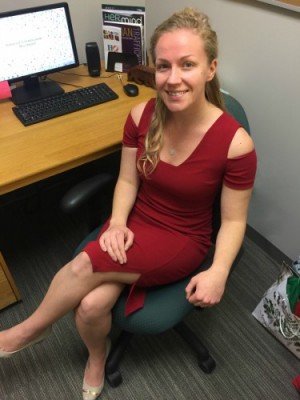Attacking Trafficking From the Inside Out
A hands-on academic approach and self-examination changed the way a GSPP grad helped those in need
It’s 5:45 p.m. on a Thursday and Charlee Borg doesn’t have time to talk. She types out a quick email to reschedule a phone interview and turns her attention to the crisis unfolding in front of her.
Plans change frequently for Borg (MA ‘16), the first anti-trafficking coordinator at HopeWorks of Howard County, Md., which serves victims of sexual and domestic violence and human trafficking.
On any given day, she finds herself collaborating with communities and task forces to increase trafficking education. Sometimes, her time is spent training organizations on the signs of trauma or on developing relationships with local law enforcement and hospitals.
But her greatest satisfaction comes on days like this, when the 24/7 hotline rings and the schedule goes out the window. It’s when trafficking survivors – whose needs are often more pressing than even victims of domestic violence – seek emergency shelter or help in a hospital. They often arrive without suitcases, personal belongings, savings accounts or transportation.
“I think that people would be surprised at how much joy and growth and resilience that I am able to see in the work that I do and how fulfilling that is,” Borg says, when asked how she handles the emotional demands of her work. “Those are the pieces that shine much more brightly than the darkness people feel this field is shrouded in. Working with the clients themselves is incredible. They are strong and resilient and beautiful.”
Borg has felt drawn to her field since childhood, a time she remembers as “tumultuous.” She says she didn’t want other kids to go through what she had witnessed. In middle school, essay assignments became opportunities to broaden her interest and knowledge in gender-based violence and repression.
“I wanted to make people’s lives better,” she says. “First I thought I would try to impact the lives of children and that would move into adulthood. Then I realized work is needed that impacts the lives of the adults impacting the lives of children.”
An undergraduate degree from the University of Wisconsin-River Falls was a start, but Borg wanted more. Something that could take her beyond marriage and family therapy. She wanted the skills to make a difference internationally and dive deeper into her specialty: crisis response and intervention.
She found everything she was looking for — and more — in Denver at the Graduate School of Professional Psychology’s International Disaster Psychology program. She especially appreciated the program’s push toward practicum and real-life skills.
“There was a requirement that you understand yourself personally and to understand the situations that you had faced and you might not have faced,” she says. “That only made me a better and stronger person which I think is one of the factors in being able to be a genuine and conscientious provider.”
Personally and professionally, Borg left campus feeling more prepared than ever to pursue her passion.
“I felt like a piece of artwork just deconstructed and put back together to become something better and stronger,” she says. “A more genuine version of myself.”









